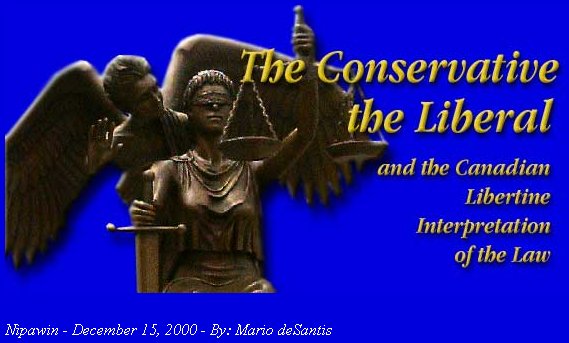Learning Stories
by
Mario deSantis
mariodesantis@hotmail.com
“I am a Canadian, free to speak without fear, free to worship in my own way, free to stand for what I think right, free to oppose what I believe wrong, and free to choose those who shall govern my country.” - -The Rt. Hon. John Diefenbaker, Canadian Bill of Rights, 1960
“The whole judicial system is at issue, it's worth more than one person.”--Serge Kujawa, Saskatchewan Crown Prosecutor, 1991
“The system is not more worth than one person's rights.”--Mario deSantis, 2002
Ensign Stories © Mario deSantis and Ensign
|
|
We have been following the five week legal battle for the US presidency between George W. Bush and Al Gore. Gov. Bush has been declared president-elect by default(1), mostly because of the US Supreme Court's statement that "Because it is evident that any recount seeking to meet the Dec. 12 date will be unconstitutional ... we reverse the judgment of the Supreme Court of Florida ordering the recount to proceed(2)." And December 12 is the statutory (written law) deadline for states to select their delegates to the Electoral College, and December 18 is the date when the Electoral College chooses the next president. As a consequence, we can say that the US Supreme Court provided a textual interpretation of the law, rather than a contextual interpretation of the law. The textual interpretation of the law is very narrow and is limited to the textual or literal interpretation of the law; the contextual interpretation of the law refers instead to the intent of the legislators when they wrote the law to be effective(3). So, in practice, George Bush has been declared president-elect, because today he has more certified votes in Florida than Al Gore's and the Supreme Court has stated that there is no time for a recount of the votes (textual interpretation of the law). If the recount would have been allowed, the statutory dates of December 12 and December 18 would have been ignored, and due importance would have been given to the democratic principle that every vote counts (contextual interpretation of the law). We must remember, that one ongoing theme of our articles on Ensign has been dealing with how we define the truth, and we have been saying all along that the truth is not something which is absolute, but we individually construct our own truths through our own living experiences. And we find our truths within our relationships and our pattern of behaviour, and we use our own language to relate to each other. But we must know that the language we use is our own construct, it is our own invention. As a consequence, it is impossible to express ourselves in a so called objective way, that is different people can write the same sentence and have different intentions, and different people can write different sentences and have the same intention. Since we use our language differently, we must say that there is no such a thing as an objective law, the law is always subject to interpretation. And in one way, I can generalize and say that 'conservative' justices apply the law within a textual and narrow framework, while 'liberal' justices apply the law within a larger and purposeful societal context. Remember when Ethics Counsellor Howard Wilson stated that there was no law to be applied when Prime Minister Jean Chrétien individually intervened for the granting of the BDC's $615,000 loan to his friend Yvon Duhaime(4)? Well, in this case Mr. Wilson did not apply the 'liberal' interpretation of the law, and he did not apply the 'conservative' interpretation of the law either, what Mr. Wilson did was to apply the libertine interpretation of the law. Yes, the libertine interpretation of the law should not exist in a democratic society, but we have it in Canada, it is the interpretation of the law for the few and privileged. References/endnotes Relevant political and economics articles http://www.ftlcomm.com/ensign 1. Bush Elected by Supreme Court, FTLComm - Tisdale - December 13, 2000 2. Supreme Court hands major win to Bush; Gore urged to concede, Jan Cienski, with files from Alexander Rose, December 13, 2000, National Post 3. What Is Law? A Search for Legal Meaning and Good Judging Under a Textualist Lens, Roger Colinvaux 4. Prime Minister Jean Chrétien's involvement with the BDC's $615,000 loan, Part 4. Doling of governmental money, by Mario deSantis, December 9, 2000 |
